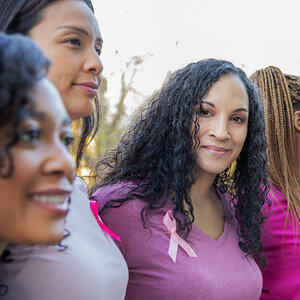Black women more likely to die from breast cancer, report finds

Black women are about 40 percent more likely than white women to die from breast cancer, a report from Susan G. Komen finds.
The report, Stand for H.E.R.–A Health Equity Revolution Breast Cancer Impact Report (27 pages, PDF), found that Black women are being diagnosed younger and with more aggressive forms of breast cancer than their white counterparts, with factors such as implicit bias, substandard care, and systemic racism contributing to this discrepancy. To assist these patients, Komen’s Financial Assistance Program has provided more than $4.7 million to almost 9,000 Black patients over the past three years to help with daily living expenses while they continue treatments.
In 2021, Komen launched Stand for H.E.R.—A Health Equity Revolution to remove barriers to high-quality breast care for Black women across the country by applying five health equity drivers: patient support, education, workforce development, research, and public policy. According to the report, the program has provided educational resources and programs to equip Black people with knowledge about breast health, including understanding risk, screening basics, getting high-quality care, and genetic counseling and testing. In addition, the program supports professional development for scientists from underrepresented communities through research grants and the Komen Patient Navigation Training Program, which has educated over 1,000 Black patient navigators, enhancing their ability to address barriers to care. To date, Komen has invested nearly $140 million in more than 320 research grants and nearly 190 clinical trials focused on advancing critical disparities research, and the organization’s Center for Public Policy has supported 56 federal bills this year.
“Black women continue to face significant barriers to breast cancer care, regardless of what age they are, if they’re insured, or where they live,” said Susan G. Komen president and CEO Paula Schneider. “As highlighted in our report, the Stand for H.E.R. program creates a scalable model to support marginalized populations experiencing breast health inequities. It calls on us to create a world where everyone has access to high-quality care and the same chance of survival.”
(Photo credit: Getty Images/Courtney Hale)




